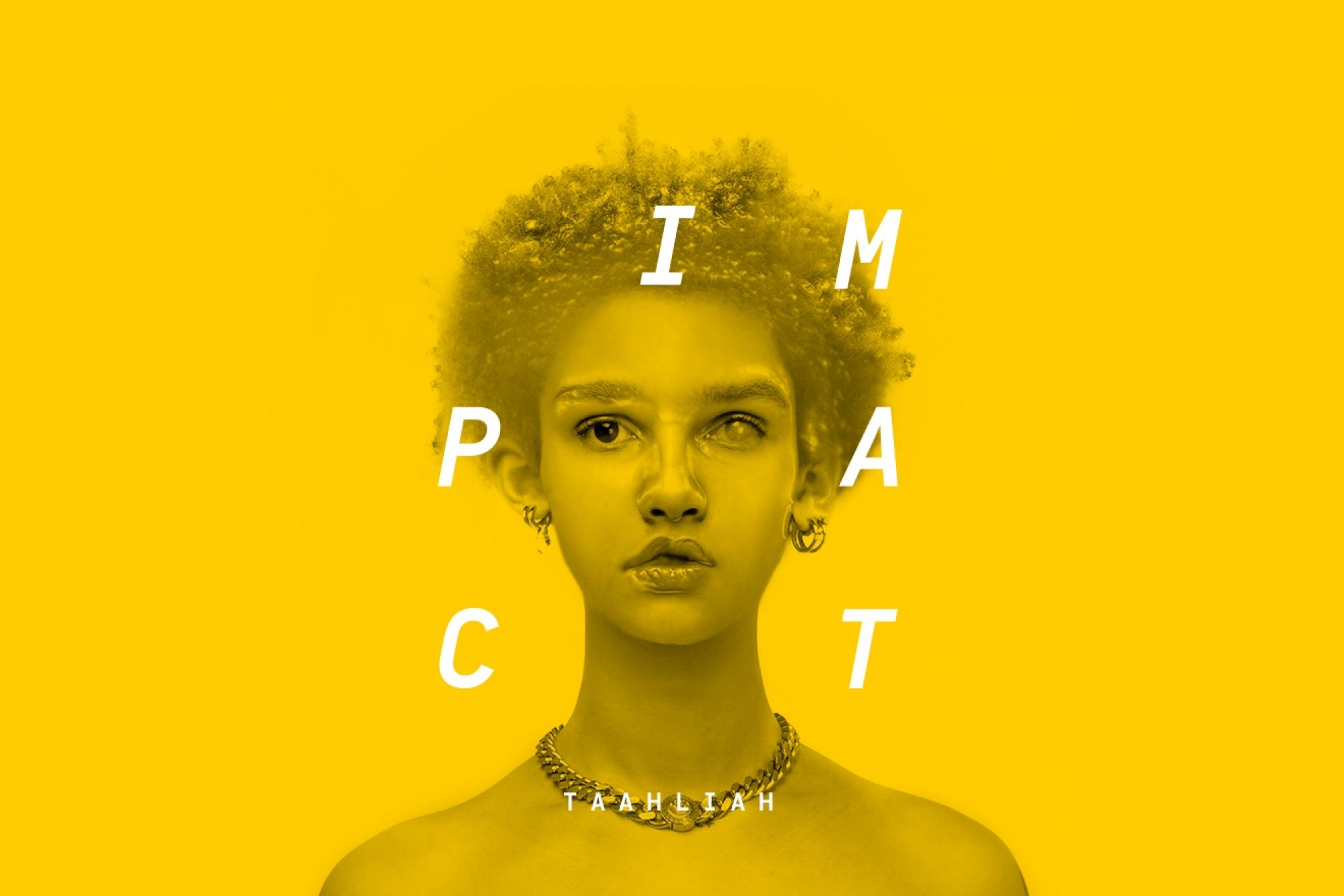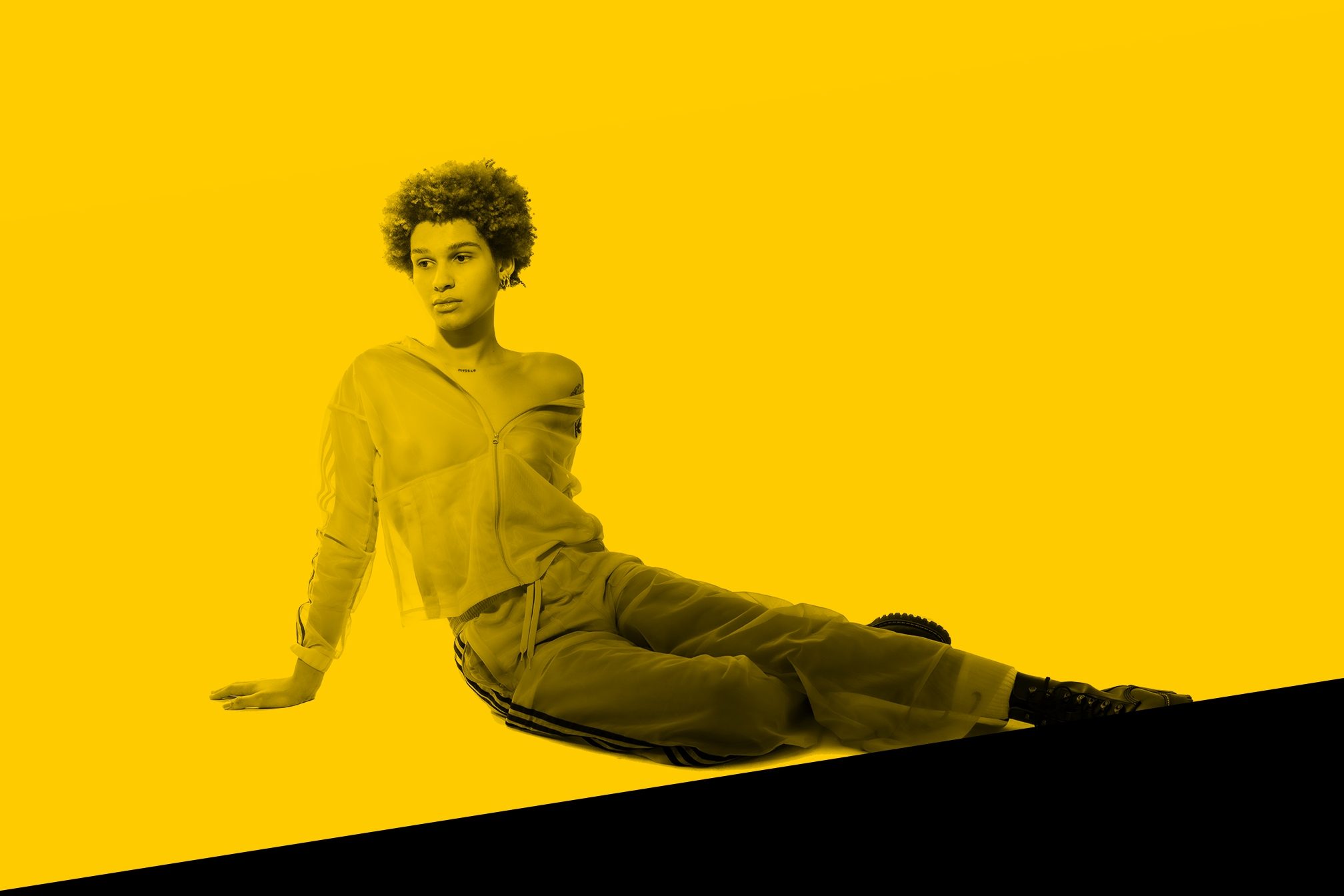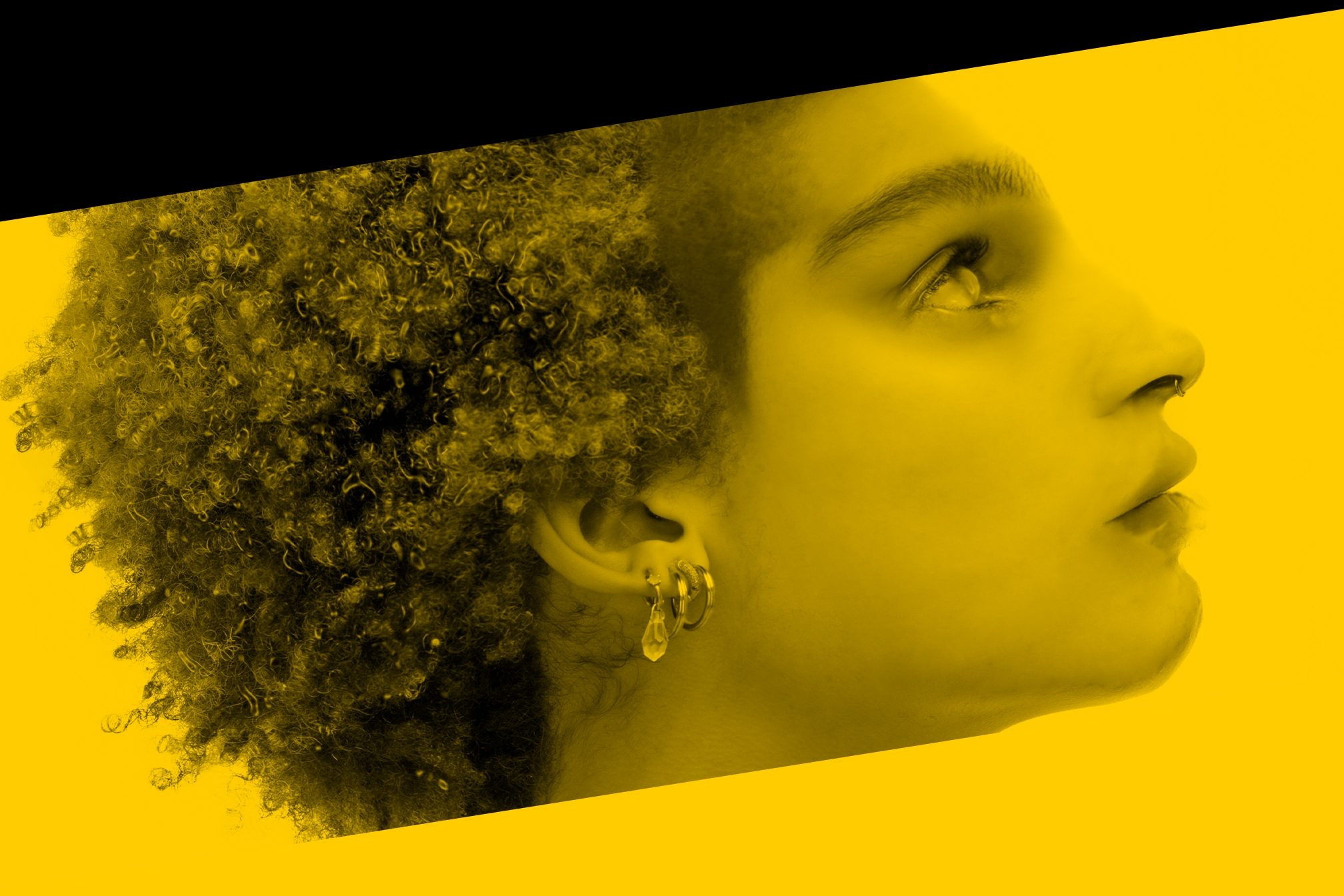 Music
Music
"Never constrained by anything": TAAHLIAH's fearless creativity fuses emotion, pop and experimental electronics
Tope Olufemi speaks to TAAHLIAH, the boundary-breaking Scottish artist combining innovative synthesis and powerful themes
TAAHLIAH first started listening to rave and hardcore music in primary school, influenced by her upbringing in Kilmarnock. That early inspiration fed into her debut single ‘Brave’, which came out in February of this year, merging pop influence with surging electronic production. “The working class culture and rave tunes and hardcore music [in Kilmarnock] has definitely influenced my work,” she notes.
Kilmarnock, a Scottish town around 30 miles south-west of Glasgow, wasn’t the easiest place to grow up. “It’s quite a white working class area, and it’s pretty rough,” she says. In secondary school, her interest in rave music remained, but due to bullying, she drifted away from the crowd that listened to it and found herself delving into “more alternative, subdued genres”. FKA twigs, Purity Ring and Zola Jesus became favourites, with TAAHLIAH drawn to the “songwriting and the emotions that were invoked”, as well the “marginalized narrative” reflected in the music.
Moving to Glasgow to study at the School of Art in 2017, TAAHLIAH began “going to clubs and experiencing a more experimental electronic environment”, as well as soaking up the surrounding creative culture. She started making music while studying there, aligning her electronic and alternative influences into hybrid tracks. High levels of emotion and pitched-up vocals exploring issues such as transphobia are channelled through innovative synthesis, unafraid to explore brash and abrasive sounds.
Her debut EP, ‘Angelica’, coming out via untitled (recs), was made during lockdown, and is an incredibly exciting introduction to the world that TAAHLIAH is seeking to create with her music. The project was initially intended to only be a four-track project, but inspiration took over, and it ended up spilling over into a seven-track offering of next-level sonics.
TAAHLIAH’s fearless approach also translates to her DJ sets. In 2019 she moved to Berlin for six months to study on exchange at Universität der Künste, and while there played alongside innovators like SOPHIE, Eris Drew and LSDXOXO. Last year she stayed active through the pandemic, playing queer Zoom rave Club Quarantine and Minecraft’s Lavalpalooza virtual festival, alongside peers such as A. G. Cook and Namesenda, each making their own boundary-pushing sonic universes. She also became the first Black trans artist to be nominated at the Scottish Alternative Music Awards, and the first ever artist to be nominated and win in two categories in the same year.
TAAHLIAH’s Impact mix is full of unreleased material and demos for those who crave more of her energetic, charged music. Check it out alongside a Q&A below.

How did you start learning synthesis and the production side of things during art school?
I’ve always been a fan of SOPHIE, and how she made her music with a monomachine, and I always thought that that was an interesting way of making music. I started DJing probably around three years ago, and then I started learning how to make sounds at the end of 2019, when I moved to Berlin. I guess I was trying to look at it from more of a performance angle.
I was still working with software synthesisers, but I also wanted a way of being able to perform live through a single unit. How a singer would sing on a microphone or something like that - I wanted there to be that level of tactility. When I researched, the Elektron synth seemed to be the one that could do the most and allowed the most freedom, so that’s when that started.
A lot of it was [learning from] YouTube tutorials to actually get to grips with it, but then after I learned the basics of using the machine, I just kind of taught myself. I find that method of working - teaching myself how to do something - is the best way for me to learn. I’ve always been like that, I taught myself how to paint, obviously got into art school. Taught myself how to DJ, taught myself how to make music, it’s just the way of working that I can really connect with. I really find solace in making mistakes and being really shit at stuff.
Your sonic palette is quite electronic. Do you have inspirations within that field?
It really depends; a lot of the electronic music I listen to now is by my peers, or by people that I work with, or that I know outside of music stuff. When I was in art school, going to clubs and experiencing a more experimental electronic environment, going to see Honey Dijon, definitely shaped my music. Not even listening to particular artists, but being immersed in that kind of creative culture. Influences come from all over the place, it just so happens that electronic music for me was the most accessible form of music to make, I started making music when I was in art school, and I got an Elektron Digitone which I still use to this day, and I got Ableton. That was the means of creation that made the most sense to me, because it allowed me to open up my practice and never feel constrained by anything. Because obviously, with electronic music you can basically do anything.
Read this next: Incandescent teacher: Honey Dijon is lighting up the world of dance music
What has it been like working on ‘Angelica’? Where did you draw inspiration from when making the project?
It’s been quite an interesting experience, obviously it’s my first project… You come into something and you don’t really know what it’s going to sound like. Originally, ‘Angelica’ was just meant to be a four-track dance EP, it was never meant to be anything that perhaps would talk about my life or my experiences as a person or anything like that. It’s been a really cathartic experience, I started making the EP just when the first lockdown hit, so the first song that I made was ‘Brave’. It was really nice working with music in a way that I wasn’t before - before it was mainly instrumentals and club tracks, and there was no vocals involved. ‘Brave’ was the first song that I’d made that actually worked with vocals, and Sophie Hannah - the person who I collabed with who’s worked on ‘Brave’ and ‘Freefalling’ - we work really, really well together. It was just a really lovely experience.
I think it’s been quite interesting because the EP spans a lot of personal narratives that I’ve been thinking about or that I’ve been experiencing over the past two or three years, so it’s quite nerve-wracking to be putting out a project that’s so deeply personal. But I also can’t really imagine putting out my debut project and it not being very personal. I feel like my experiences with [the] social and political influences of my identity are all very much ingrained in my music. There was no way that I would have been able to escape it, if that makes any sense. I’m always going to be first and foremost an artist.
How did the pandemic affect your collaborating on the EP? Did you find yourself making more under lockdown?
Yeah I think I definitely made a lot more music than I wanted to. Basically all the tracks that feature collaborations or guest vocals were created through FaceTime and iMessage, which I actually find a really nice way of working.
It’s also been the method of working that I’ve known, because I properly started to make songs during the first lockdown, so there was no way I was able to get into the studio with anyone. It took the pressure off the performative aspect of creating music in a studio, which I get a little bit of anxiety over, because sometimes my best ideas come to me when I’m just lying in bed and not necessarily sat down at a desk, trying to make something. So it allowed the freedom for that which I’m actually very grateful for. There’s been pros and cons to the lockdown experience but I guess the way that ‘Angelica’ was made was right for that moment in time. Now I feel a lot more equipped and able to make music in a more interactive way, or even just in real life.
Read this next: The year of no gigs

On ‘Never Lose’ you talk about transphobia, what did it feel like tackling something so personal and unique in that way?
It felt like a relief, it felt like my way of dealing with what I’ve experienced and what has been going on in the world. I always feel like that is my preferred method of communicating, through my art and my music. You’re dealing with all of these emotions, your identity is being neglected, your rights are being stripped away from you, and it seems like your entire identity is up for debate. I felt like there was no other way for me to communicate that other than through song. Obviously I’m an activist and I can talk so much about things, and I can be very open about pushing for change. But also, one of the most accessible forms of art is music.
Another perspective on it was that if someone who’s not trans, someone who’s cis can listen to this song and find an understanding of what trans people and non-binary people are going through at this current moment in time, then that’s also a really beneficial thing. It’s not a reason why I’m making the music, I’m not trying to pander to a set audience, but if they are able to take something from the music, a better understanding of a particular issue, then I feel like that’s a good thing.
Read this next: Baby Weight is the Dolly Parton-loving DJ who's here to take tech-house back from the Big Room Bros
Do you feel your identity as a Black trans woman affects your process/music?
I think it definitely affects the way that people interact with my music. I don’t know if I can really speak on how it affects my process or my way of making music because it’s the only process or way that I’ve known. I don’t really have anything to compare it to. But as I said earlier I’m always coming at it from an angle of, perhaps personal clarity, or even collective understanding.
If I’m able to make a song that talks about collective experiences of trans people, queer people.. I think that’s a really lovely way of making work because, on one end of the spectrum it’s so deeply personal to me but on the other end it’s like, so many people can relate to it. I’m really interested in the relatability of music as well and how we can use it as perhaps a collective way of understanding and healing.
There are many artists within the electronic scene who are gender-nonconforming and transgender, how do you feel gender can unravel within electronic music?
Perhaps the flexibility of it… Even though electronic music is a very white, male, straight, cis dominated industry, but I think when you take away the industry and you look at electronic music at its fundamental basics, it’s genderless at the end of the day. When you think about people like Wendy Carlos, the real pioneers of electronic music and you look back at its history, how can gender not influence it when it was in the hands of gender non-conforming people all along.
I think it allows the artist to really express themselves in a way that perhaps traditional forms of creating music doesn’t. Like, singing, or guitar - while these are very relevant forms of making music - they’re also very gendered practices. Drums and guitar are more centered towards masculine presenting people and vocals are geared towards more feminine presenting people which is obviously so incorrect and so wrong. I don’t think electronic music has that initial gendered shift to it. I think about when I was in High School, my main instrument was piano, but I also really wanted to sing - but I was so fearful of the shit I would get, being at that point a ‘boy’. It’s something I wasn’t going to put myself through and it’s a shame that this gendered, cis-gendered language is so ingrained in traditional music as well.
It’s like, when you’re growing up in school and there’s the concept of guilty pleasure, or the concept of listening to a particular artist and but never telling anyone that you’d listened to them because you’re fearful of the opinion or the route of action that the other person and the other side of the conversation might have.
Read this next: 20 women who shaped the history of dance music
In light of everything slowly opening up, so much of electronic music is about experiences, in clubs and communal spaces. Are there parts of that that you miss and that you’re longing to return to?
Yeah absolutely, the real con of making music during lockdown was there was no audience or live interaction to it. Whenever I would make a song and I would play it during a DJ set, it’d be a real eye-opener or I would be able to gauge where the song needed to go or what needed to be stripped-back or what needed to be intensified or driven a little bit more. I’ve not been able to get that kind of communicative analysis of the work which I’m very much missing. I’ve literally made so much music since lockdown, so I’m just really excited to be able to play it to people, whenever that’s going to happen. But I very much really did struggle with no live performances; I feel like being able to perform live and interact with the crowd through sound is a form of therapy for me. It was very much a way that I could express myself that I haven’t been able to do for over a year, which has been like a real struggle mentally as well.
Can you tell us about your Impact mix?
My Impact mix contains entirely my own productions, featuring new pieces I’ve been working on, remixes of some of my current favourite tracks of 2021; mixed in with some of my first ever productions as well as new live work - an expansive journey in the sonic aesthetic I’m still curating.
TAAHLIAH's 'Angelica' EP is out May 28, get it from Bandcamp
Tope Olufemi is Mixmag's Digital Intern, follow them on Twitter
Tracklist:
TAAHLIAH — ID (ft. Elouiza)
TAAHLIAH — ID
Ethel Cain — Inbred [TAAHLIAH Remix]
TAAHLIAH — Tears (ft. Lady Neptune)
TAAHLIAH — Everlasting (ft. sarya)
Tink — Cum Get It [TAAHLIAH Remix]
TAAHLIAH — Balance
TAAHLIAH — Living My Life
TAAHLIAH — Daylight (ft. Tsatsumis)
TAAHLIAH — Freefalling (Euphoria Edit)
TAAHLIAH & ELFZ — Versace
Beyonce — Grown Woman [TAAHLIAH Edit]
TAAHLIAH & KAVARI — Get Down (w/ Never Lose vocals)
TAAHLIAH — Bourgeoisie
Alice DJ — Better Off Alone [TAAHLIAH Remix]
TAAHLIAH — Transdimensional (ft. KAVARI)
TAAHLIAH — Digitone Freestyle 002
TAAHLIAH & ELFZ — ID (Demo)
CHLOBOCOP — ItsNotOver [TAAHLIAH Remix]


